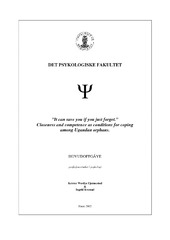"It can save you if you just forget." Closeness and competence as conditions for coping among Ugandan orphans
Master thesis
Permanent lenke
https://hdl.handle.net/1956/1680Utgivelsesdato
2002Metadata
Vis full innførselSamlinger
- Faculty of Psychology [521]
Sammendrag
This qualitative study explores the psychological constructs of closeness and competence as protective factors among Ugandan orphans. Closeness is defined as quality of dyadic relation, quality of care in the family, and supportiveness of the network. Competence is defined as being able, being of use, receiving and taking responsibility, and experience of encountering and handling adversity. Results are based on semi-structured interviews with 8 orphans and their guardians. All informants live in a slum area outside Kampala City, and are connected to a community-based organisation. The rough neighbourhood negatively affects all participants. In child-headed and foster parent-headed households, the quality of relations is poorer than in families headed by biological mothers/grandmother. The child-headed households have problems managing basic routines of everyday life. Children’s sense of competence is evident through schooling, their participation in household chores, and their coping strategies in face of hard living conditions. Children’s coping strategies include forgetting, not thinking about, accepting, adjusting, and getting an education. Although some are contradictory to Western theoretical ideals of handling adversity, these strategies appear to be culturally appropriate. Closeness is found to be significant in providing children with culturally appropriate competence. Denne kvalitative studien omhandlar tilhøyrsle og kompetanse som beskyttande faktorar hjå foreldrelause born i Uganda. Tilhøyrsle vert definert som kvaliteten på dyaden, kvaliteten på omsorgen i familien og graden av støtte i nettverket. Kompetanse vert definert som å kunne noko, å vere til nytte, å få og ta ansvar og å møte og meistre motgang. Studien baserer seg på kvalitative intervju med 8 foreldrelause born og deira omsorgsgivarar. Informantane bur i eit slumområde utanfor Kampala, og er tilknytta ein lokal grasrotorganisasjon. Alle informantane kjenner seg hemma av det tøffe nabolaget. Kvaliteten på relasjonane er dårlegare når omsorgsgivar er born/fostermor enn i familiar som er styrde av biologisk mor/bestemor. I heimane kvar born er omsorgsgivar har ein problem med å oppretthalde daglege rutinar. Kompetansen til borna kjem til uttrykk gjennom skulen, deltaking i rutinar, og meistringsstrategiar i møte med vanskelege tilhøve. Mestringsstrategiane borna syner er å gløyme, ikkje tenke på, akseptere, tilpasse seg og å skaffe seg ei utdanning. Somme av desse strategiane står i motsetjing til vestlege teoretiske idealer om å takle motgang, men ser ut til å vera kulturelt adekvate. Tilhøyrsle speler ei tydeleg rolle i overføringa av kulturelt tilpassa kompetanse.
Utgiver
The University of BergenOpphavsrett
Copyright the author. All rights reservedThe author
